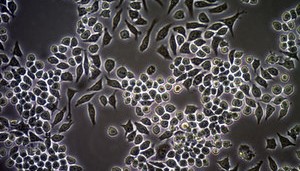Featured Products
Our Promise to You
Guaranteed product quality, expert customer support

Immortalized Murine Cells
 Murine cells show frequent spontaneous immortalization in contrast to human cells that almost never spontaneously immortalize. Addition of DNA tumor viruses alone, mild mutagen treatments and even deregulated expression of cellular genes such as c-myc are enough in certain murine cells for immortalization. Crisis stage is either not observed or is very subtle in case of murine cells, due to their ability to immortalize spontaneously, were exploited to identify genes associated with cellular mortal or immortal phenotypes. Independent studies on spontaneously immortalized clones from different strains of mouse have shown that most of these clones had one or both mutant p53 alleles, in contrast to their parent cells which expressed wild type p53. The immortal clones which expressed wild type p53 were found to be defective in one or other elements of the pRb pathway.
Creative Bioarray can provide you immortalized murine cell lines with an integrated platform for meeting the needs for virtually any relevant research project.
Murine cells show frequent spontaneous immortalization in contrast to human cells that almost never spontaneously immortalize. Addition of DNA tumor viruses alone, mild mutagen treatments and even deregulated expression of cellular genes such as c-myc are enough in certain murine cells for immortalization. Crisis stage is either not observed or is very subtle in case of murine cells, due to their ability to immortalize spontaneously, were exploited to identify genes associated with cellular mortal or immortal phenotypes. Independent studies on spontaneously immortalized clones from different strains of mouse have shown that most of these clones had one or both mutant p53 alleles, in contrast to their parent cells which expressed wild type p53. The immortal clones which expressed wild type p53 were found to be defective in one or other elements of the pRb pathway.
Creative Bioarray can provide you immortalized murine cell lines with an integrated platform for meeting the needs for virtually any relevant research project.
Description: The corpus luteum develops from an ovarian follicle during the luteal phase of the...
Description: The cementum is a mineralized tissue lining the tooth root surface and shares many...
Description: Schwann cells are valuable tools for diabetic neuropathy pathogenesis involving glycation...
Description: Schwann cells are valuable tools for diabetic neuropathy pathogenesis involving glycation...
Description: The Immortalized Rat Sympathoadrenal Progenitor Cells (MAH-A3) are derived from HNK-1+...
Description: The decidual cells play an important role in the maintenance of pregnancy at the...
Description: The Immortalized Mouse Embryonic Hepatic Progenitor Cells are non-tumorigenic, hygromycin-resistant...
Description: The Immortalized Mouse Articular Chondrocytes are hygromycin-resistant, non-tumorigenic...
Description: The Immortalized Mouse Cardiomyogenic Progenitor Cells are hygromycin-resistant,...
Description: Immortalized Mouse Dental Apical Papilla Progenitor Cells are hygromycin-resistant...
Description: Intestinal epithelial cells provide a protective barrier against bacteria, antigens...
Description: Immortalized Mouse Achilles Tendon Cells (iMAT) are derived from the Achilles tendon...
Description: Epidermal melanocytes are melanin-producing cells that function as a protective mechanism...
Description: Epidermal melanocytes are melanin-producing cells that function as a protective mechanism...
Description: Epidermal melanocytes are melanin-producing cells that function as a protective mechanism...
Description: Kaposi’s sarcoma-associated herpesvirus (KSHV) has been linked to several malignancies...

